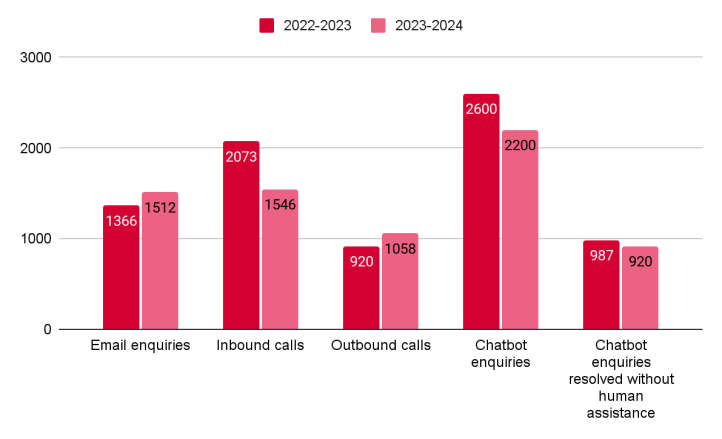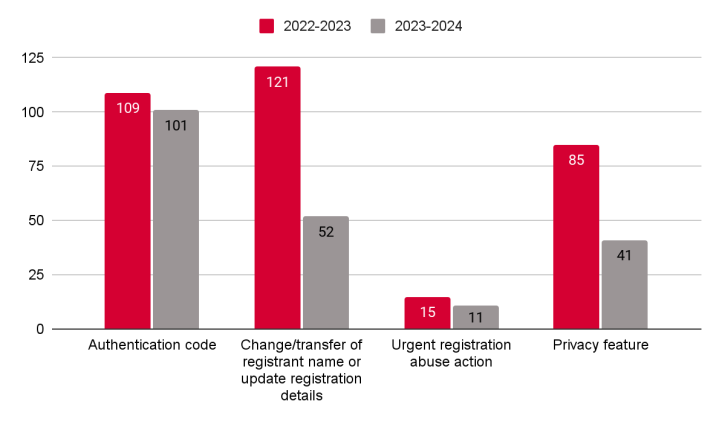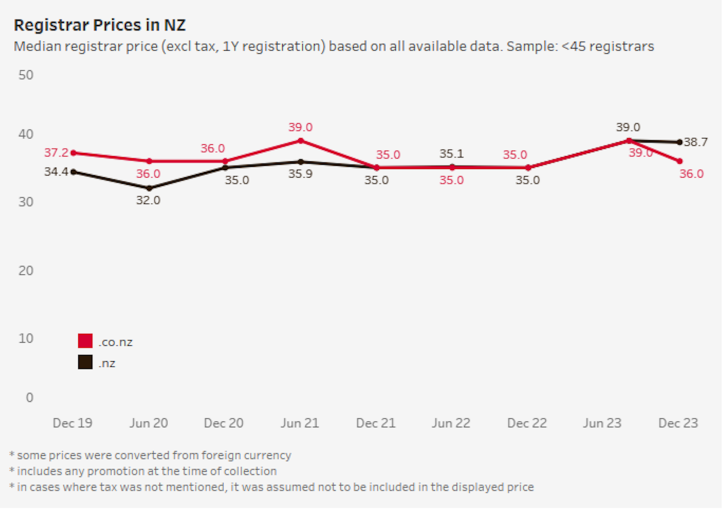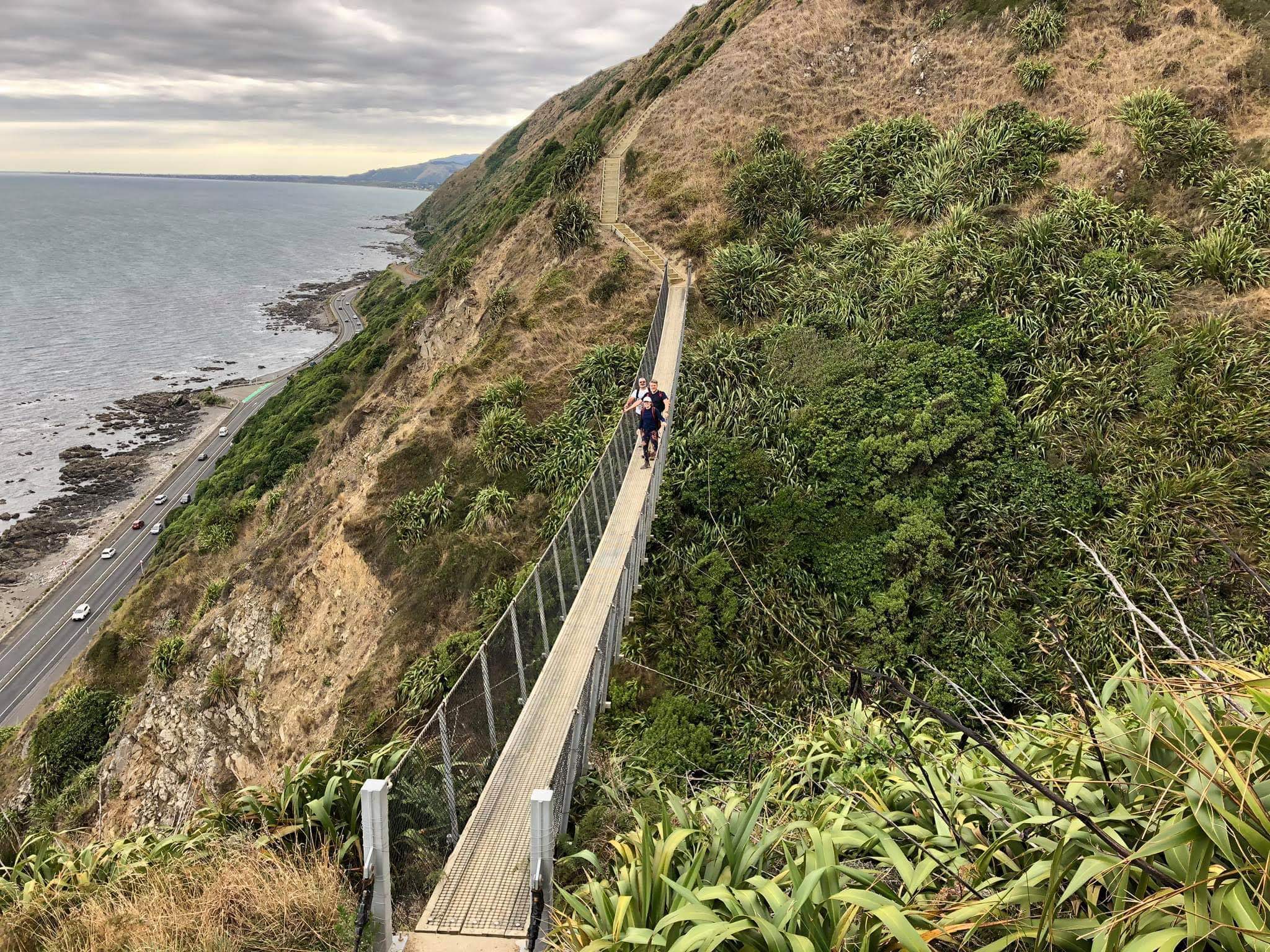2023-2024 Annual Report
Who are we
InternetNZ has appointed the Domain Name Commission (DNC), under an Operating Agreement, to oversee and regulate the .nz domain name space. Our role, responsibilities, and functions are set out in the Operating Agreement and the .nz Rules.
Domain names are key for any person or organisation to have an effective digital presence. It is important to Aotearoa New Zealand, that a trusted and secure scheme of registration and renewal is in place and that domain name holders can rely on the continued control of their domain names through a reliable domain name licensing system. It is paramount that the .nz Rules are enforced, and that all participants in the .nz domain name space know their roles and responsibilities.
Our vision:
“A .nz that is fair for everyone.” To be a fair, independent, and accessible regulator who provides trusted oversight of the .nz domain name space and an excellent dispute resolution service.
Our core functions:
- Oversee the .nz market to ensure compliance of registrars, resellers, and domain name holders with the .nz Rules.
- Enforce the .nz Rules.
- Authorise and remove registrar authorisations.
- Provide a dispute resolution service for .nz domain names.
- Provide a customer services function to attempt to resolve queries from the public regarding the .nz domain name space and its operation.
- Investigate and resolve complaints regarding registrars.
- Publish information and reports related to our functions.
- Maintain an understanding of the competitiveness of the .nz market.
- Participate as part of the InternetNZ Group in relevant international forums and events to share knowledge and skills and keep up to date with emerging issues.
Chair's report

I'm pleased to share with you the Annual Report for 2023–2024, as the Chair of the Domain Name Commission (DNC). This report reflects our commitment and efforts to achieve our vision of being a fair, independent, and accessible self-regulator who provides trusted oversight of the .nz domain name space.
We have had some changes on the Board this year. Anita Killeen stepped down as an Independent Director following four years of service. Anita’s leadership and expertise have been pivotal in guiding strategic decisions, particularly the vision for quality dispute resolution and the options for how we might improve our dispute resolution offer. This meant there was a vacant seat on the Board.
In February, we welcomed our new Independent Director, Wi Pere Mita. Wi Pere joins us with a background in governance through a Te Tiriti lens and has legal and dispute resolution experience. The appointment comes at a crucial time as we continue our work to centre Te Tiriti o Waitangi in the .nz domain name management.
Another focus in 2023–24 has been introducing the Domain Name Commissioner to the international governance forums and networks. This has led to identifying best practices, joining working groups, and ensuring the DNC team is learning based on the wealth of experience in the ccTLD world.
Looking ahead, we recognise the evolving challenges and opportunities in the regulatory space and will be starting to put together the new strategic framework for 2025–2027.
I want to thank the team led by the Domain Name Commissioner, Barbara Pearse. The team’s responsiveness to new leadership and enthusiasm for new improved systems and regulatory processes has been instrumental in driving our success and advancing our strategic objectives.
To the Independent Directors, I thank you for your commitment to the important work of the DNC.
Nāku noa nei, nā
Vivien Maidaborn, Domain Name Commission Chair
Commissioner’s report

I am pleased to share that over the last year we have made significant progress in implementing our three-year strategy and have been able to continually improve and develop our ways of working. This Annual Report offers insights into this work.
During 2023–2024, the DNC team continued to collaborate with key stakeholders to combat domain name abuse and to investigate suspected .nz Rule breaches. Building strong relationships and collaboration is crucial for effective regulation and maintaining a secure and trusted .nz domain name space. We work with organisations such as the New Zealand Police Cyber Crime Unit and CertNZ to receive referrals of suspicious .nz domain names we can put through our data validation process. This year, there was a significant increase in the number of referrals we received, with 1,038 compared to 283 last year (a 267% increase).
This year, we also saw a significant increase in referrals, dispute resolution complaints, and suspensions of suspicious .nz domain names that appear to be resolving to fake webshops or copycat sites. While we do not assess how domain names are being used, we are seeing the majority of those suspicious domain names suspended due to the registration data not being validated.
We have completed a number of key projects to ensure our systems and processes are fit for purpose, including moving systems to the cloud and completing the online dispute resolution pilot. After exploring the viability of outsourcing the administration of our dispute resolution service, it was decided to outsource the service to avoid the need for capital expenditure for a new system and related ongoing maintenance costs; to minimise key person risk (as only one person in the team had the capability and access to administer it) and to provide access to cultural support for Māori and Pasifika and accessibility support for the deaf community should that be requested. The implementation phase will be in mid-2024 and there will be more information available before then.
We also commenced a review of our registrar authorisation process, supporting collateral, and registrar agreement. The process had not been reviewed extensively since its inception circa 20 years ago. We want to provide more guidance to applicants on the minimum standards and criteria that the team will assess. We aim to roll out the new process and guidance around mid-2024.
I would like to extend my thanks to the team. The work covered in this report is only possible due to their hard work and dedication, and I am grateful for their continued commitment to our important mahi.
I also thank the DNC Board, led by Chair, Vivien Maidaborn, for their guidance and support.
Tēnā koutou katoa
Barbara Pearse, Domain Name Commissioner
Highlights
747,256
domain names, a 1.3% decrease from 757,114 at the same time last year.
111,203
domain names with the privacy option applied, a decrease of 3,848 from the same time last year.
1,346
unresolved conflicted domain names, a 6.53% decrease from 1,440 unresolved at the same time last year.
607 (5 .nz domain names)
Child sexual abuse material (CSAM) related URLs on .nz domain names were identified through our membership with the Internet Watch Foundation, passed to the Department of Internal Affairs for review, and takedown notices actioned. A 4% increase on last year.
74
registrars. 42 are incorporated in New Zealand. Three registrars joined the .nz market during the year. Two registrars exited the .nz market.
1,038
domain names were put through our data validation process, a significant increase from 283 last year. 856 (82%) of the domain names were suspended for failed data validation.
Top suspension category for failure to verify details
65% retail trade — a significant increase from 26% at the same time last year.
Strategy
Our 2022–2025 strategic plan includes five strategic outcomes:
1
Ensuring a fair, effective and efficient .nz self regulatory system.
2
Driving a culture that promotes .nz market participants readiness and ability to comply with expectations set by policy, sound risk management approaches, and broader New Zealand community standards.
3
Fostering fairer, simpler and contemporary forums for people to resolve complaints with their service providers and disputes with each other.
4
Driving DNCL’s regulated population to tackle domain name abuse in line with cross sector and jurisdictional commitments to minimise online harm for consumers.
5
Future-proof our organisation and operating model to deliver services and value that matter to our stakeholders and create a fun place to work.
Impact

Enquiry Management
Providing great customer service and resolving enquiries is core to our role in promoting and protecting the rights of domain name holders. We aim to resolve each enquiry in a fair and timely manner. We ensure we prioritise enquiries that may impact the ability to use a .nz domain name.
Enquiry numbers by channel:
The chart below compares enquiry numbers by channel in the 2022–2023 and 2023–2024 financial years. While the number of email enquiries and outbound calls increased slightly from last year, we have seen a decrease in enquiries across all other channels.

Image description of enquiry numbers by channel chart
The number of email enquiries increased from 1366 to 1512 in 2023–2024. The number of inbound calls decreased from 2073 to 1546 in 2023–2024. Outbound calls increased from 920 to 1058 in 2023–2024. Chatbot enquiries on the website decreased from 2600 to 2200 in 2023–2024. The number of enquiries resolved by the chatbot without human assistance also dropped from 987 to 920.
Examples of enquiries:
Over 2023–2024, the number of requests for authorisation codes and urgent registration abuse action decreased slightly. However, we are pleased to see significant decreases in the number of requests for changing/transferring a registrant's name and enquiries relating to the privacy feature (how to apply or wrongful use by a company).

Image description of examples of enquiries chart
The number of enquiries for authentication codes slightly decreased from 109 to 101 in 2023–2024. The number of enquiries to change/transfer registrant name or to update registration details decreased significantly from 121 to 52 in 2023–2024. Urgent registration abuse action requests slightly decreased from 15 to 11 in 2023–2024. Enquiries relating to the privacy feature significantly decreased from 85 to 41 in 2023–2024.
Customer feedback
On completion of email enquiries, parties are given the opportunity to feedback on their experience with us. Over 2023–2024, we received an average rating of 3.8 out of 5 stars (157 customer surveys completed, 1 star = very poor, 5 stars = very good).
We review all feedback received to identify ways to improve the experience parties have with us. Below are some snippets of the positive feedback we have received.
"[Staff member] was amazing on the phone. When I called and explained what the issue was, they guided me through what the DNC would need and how to log my complaint and made what is a stressful situation, into something that would be easily dealt with and it gave me peace of mind that the DNC would do everything that they can to hopefully get my domains names back for me! Can't fault your level of care, commitment, and customer support/service!”
“Extremely helpful first response with links and also very quick to respond. We felt we were in good hands and greatly appreciated their professional & knowledgeable assistance.”
“Fantastic service, super helpful and friendly. Couldn't ask for a better service.”

Dispute Resolution Service
Providing a Dispute Resolution Service (DRS) is one of our core functions outlined in the Operating Agreement.
At times, parties disagree about who the domain name holder of a .nz domain name should be (the DRS also applies to sub-domains). We facilitate a low-cost dispute resolution option compared to litigation, and we are not aware of any other ccTLD that provides a free mediation service for domain name holders.
In 2023–2024, we received 60 enquiries about using our DRS, and 32 complaints commenced the dispute resolution process. This is in addition to complaints that commenced and were not resolved from the previous year.
Online dispute resolution
In December 2023, we concluded the Online Dispute Resolution (ODR) pilot and started exploring the viability of outsourcing the administration of the DRS. A decision was made to move to an outsourced model, which will be implemented in 2024–2025, along with a review of the DRS policies and rules which have remained largely unchanged since inception circa 20 years ago. We will facilitate a consultation process on the proposed DRS policies and rules and welcome submissions from anyone interested or impacted.
Expert decisions
Expert decisions are where a party in a dispute over a .nz domain name requests to appoint an independent person — the expert — to decide if the domain name should remain with the domain name holder (dismissed) or be transferred to the party who submitted a complaint (transferred).
Over 2023–2024, 23 expert decisions were issued (compared to seven last year) — six were dismissed and 17 domain names were transferred. This includes decisions related to complaints that were submitted in the previous year. We have seen more demand for the expert decision process particularly where complaints relate to suspected copycat websites which negatively impact businesses and their brands. Proposed changes to the DRS policies and rules will seek to provide the ability for complainants to go straight to an expert decision process if they don’t want to attempt mediation.
One appeal panel decision was also issued during the reporting period.
We publish summary and full decisions on the our website.
Case studies
For an expert to decide that a disputed domain name should be transferred, they have to find that the complainant has rights in a name or mark similar or identical to the disputed domain name and that the domain name meets the threshold for an unfair registration.
Complainants need to consider what evidence and information they provided in their complaint regarding the domain name being an unfair registration as the expert shall not take into account any evidence of acts or omissions amounting to unfair registration or use which occurred more than three years before the date of the complaint.
electrasafe.co.nz (result — dismissed, not enough evidence)
Two businesses operating in the electronic machinery industry were disputing the domain name electrasafe.co.nz. The domain name had been registered since August 2004. Both parties engaged in the DRS, providing relevant information for the expert to consider.
The expert found that the complainant proved that they did have rights in a name of a mark similar to the disputed domain name; this relied on the existing trademarks that the complainant submitted as part of their complaint. However, the expert found that, due to the lack of evidence provided in the complaint relating to unfair registration, and the limitation of only being able to consider information provided that relates to the last three years, the complaint did not meet the threshold of unfair registration.
Subsequently, the complaint was dismissed, and the domain name remained with the domain name holder. Read the electrasafe.co.nz decision.
cmpfoods.co.nz and anzcofood.co.nz (result — transferred)
This case highlights an increasing trend that we are aware of relating to domain names being registered and used (either by email or website) that are similar to an existing domain name.
The complainant submitted this dispute on 10 July 2023 alleging the respondent had registered two domain names and established two websites largely identical to those of the complainant’s companies. The respondent did not engage in the DRS process; however, they had validated their registration information in prior engagement with us.
The expert notes that upon viewing the content of the respondent’s two websites where the disputed domain names were resolving, it appeared to be the same as the content on the complainant’s websites. Without an explanation from the respondent, the expert inferred that this was indeed copied, as alleged by the complainant.
The expert determined that this met the threshold to be considered an unfair registration and it was likely to confuse, mislead or deceive people. Read the cmpfoods.co.nz and anzcofood.co.nz decision.
Mediation
In mediation, the parties speak for themselves and negotiate a domain name resolution with help from a neutral expert called a mediator. We offer a free mediation service for disputes.
In 2023–2024, 10 informal mediations commenced up from nine in the previous year. Three were settled, and seven were not settled.

Compliance, enforcement, and .nz Rules
Our role is to enforce the .nz Rules and contractual framework regarding the .nz domain name space. We also contribute to InternetNZ’s .nz policy-making work and ensure our regulated parties understand their obligations.
Domain name suspensions
Under the .nz Rules, domain name holders are required to ensure their registration details are accurate, complete, and kept up to date. We may request that domain name holders verify their identity within a timeframe detailed in any request.
We will check whether a domain name holder is contactable at the details they have provided on the .nz register and meets the eligibility criteria in the .nz Rules. Where verification is not completed we may suspend the domain name. We refer to this as the data validation process.
We identify domain names for data validation based on referrals of suspected malicious use.
Part of our effectiveness as a regulator is having strong relationships with other organisations in our ecosystem. Partnership work is critical to maintaining a secure and trusted .nz domain name space. We work closely with external stakeholders to receive and investigate referrals of .nz domain names.
We engage with several external stakeholders, including, but not limited to, New Zealand's Computer Emergency Response Team (CERT NZ), New Zealand Police Cyber Crime Unit, Netbeacon Institute, CleanDNS, registrars, and the general public.
![]()
1,038 suspected malicious domain names were put through our data validation process, a significant increase from 283 last year.

Of the 1,038 domain names, 856 (82%) were suspended for failed data validation. The suspension rate increased from 70% in 2022–2023 to 82% in 2023–2024.

We use an additional layer of identity validation through our third-party vendor to undertake biometric ID verification. We use this tool in some instances when parties respond to our staff, and we want to ensure that the identity of the domain name holders meets .nz Rules. Of the 66 domains put through the identity verification service, 41 passed our additional due diligence and were not suspended.
Reasons for domains not resulting in suspension include that the domain name holder was contactable, the domain name holder validated their identity, or the registrar had already suspended the domain name.
Data validation trends
As highlighted at the beginning of this report, we saw a significant increase in the number of retail trade-related referrals (such as websites offering well-known branded goods for sale at significantly discounted prices or suspected copycat websites that ‘appear’ to be legitimate). On receipt of a referral, we classify it by the industry that the domain name relates to, based on the information available to staff at the time.
Interestingly, 93% of referrals classified as retail trade are suspended as part of our data validation process, this shows a strong correlation between malicious use of .nz domain names relating to retail trade and registration information that does not meet .nz Rules. This suspension rate is above the average for all referrals that we receive.
Engagement with registrars
During the year, we commenced targeted proactive engagement with registrars to provide more insights and guidance to manage enquiries, issues and complaints reported by domain name holders. We have provided more clarity around our expectations for resolving issues such as issuing authorisation codes within 48 hours of receiving a domain name holder’s request, and we expect to see complaints on this topic decrease.
We have also reignited our in-person engagement with registrars, and this will increase in the coming year as we develop our plans and focus areas. We plan to start connecting more with our globally based registrars as we continue to attend international industry forums and conferences.

Market Activity
Our reports on competition, market health indicators, pricing, and other aspects encourage the development of a healthy .nz domain name system. It is one way we demonstrate proactive self-regulation.
Key indicators of market health
As of 31 March 2024, four registrars’ held 58.50% of the .nz domain name market — a slight increase from March 2023 when the same registrars held 58.19%. These figures treat each registrar separately and do not aggregate where there is common ultimate ownership.
We measure market concentration using the Herfindahl-Hirschman Index (HHI). Although increasingly concentrated, the HHI score stands at 1028, with scores less than 1,500, indicating a competitive marketplace. The year before, the HHI score was 997.
As of 31 March 2024, there were 74 .nz authorised registrars:
- Five new registrar applications were received during the year (three authorisations were granted and two authorisations were under assessment as of 31 March 2024).
- Two registrars exited the .nz market during the year.
In 2023–2024 we commenced a project to review the registrar authorisation process to set minimum standards, develop a licensing guide and new application form to ensure we obtain relevant information from entities seeking authorisation and undertake a robust process. The revamped process will roll out formally in 2024–2025.
Key market statistics
In 2023–2024, in the .nz domain name space:
- 747,256 .nz domain names (as of 31 March 2024).
- The number of .nz domain names decreased by 1.3% compared to the end of the 2022-2023 financial year.
- 634,777 .nz domains were renewed during the year compared to 251,334 renewed last year.
- 32,017 .nz domain names changed registrars during the year. In comparison to 16,881 last year.
Advertised primary retail market prices
The retail median pricing for .co.nz and .nz, excluding tax, has been relatively stable since 2019, with a small decrease in the .co.nz pricing from June to December 2023 as set out in the graph below:
The following figures are sourced from our Market Data table (RegExplorer). This is based on available data we were able to capture regarding registrar prices of .nz and .co.nz domain names.

Image description of Registrar Prices in NZ chart
The graph shows price changes from December 2019 to December 2023.
According to the graph, the median price of the .co.nz domain name has decreased over time, from $37.2 in December 2019 to $36 in December 2023. The .nz domain name median price has increased slightly from $34.4 in December 2019 to $38.7 in December 2023. The graph shows that both domains' prices stayed at $35 from December 2022.

Outreach and engagement
Photo credit: ICANN 79 photo archives
One of our core functions is participating as part of the InternetNZ Group in relevant local and international forums and events to share knowledge and skills and keep up to date with emerging issues that may impact the .nz domain name space.
We continue to develop key relationships and partnerships with our peer ccTLDs, ICANN staff, and vendors to learn and share knowledge to enable us to effectively maintain the security, stability and resilience of the .nz domain name space.
Key conferences attended in person include:
APirG, Brisbane, Australia, September 2023
The three-day annual event brings together representatives from the Asia Pacific internet community. It facilitates discussion and collaboration on how the internet is governed and how best to advance the Internet in the region.
auDA Registrar Summit, Melbourne, Australia, October 2023
The summit provided a platform for discussing key topics, including DNS abuse, security, and compliance activity. Together with InternetNZ, we presented sessions at this forum on the activities and observations from .nz’s perspective.
ICANN78, Hamburg, Germany, October 2023 and ICANN79, San Juan, Puerto Rico, March 2024
ICANN Public Meetings are a central part of ICANN's multistakeholder model. They are a space to discuss policy work, conduct outreach, exchange best practices, and showcase ICANN’s work to a broader global audience. They also facilitate connecting with our peer ccTLDs and registrars, who are located globally.
Key conferences attended virtually include:
INHOPE, May 2023
The online event facilitates a deep dive into the INHOPE Annual Report and insight into the trends and statistics of CSAM globally.
APTLD — TLD Automation Webinar, December 2023
This online webinar stems from the training session on Registry Automation delivered at APTLD84 in Seoul in September 2023. This is part of a series of webinars that touched on registry operations, zone management, DNSSEC, and the overall security and stability of the DNS.
CENTR roundtable update, February 2024
InternetNZ is an associate member of CENTR (the Council of European National Top-Level Domain Registries), and our staff actively participate in CENTR events and work.
People

The Domain Name Commissioner, Barbara Pearse, led the organisation with the support of the leadership team: Operations Manager, Dylan Connolly, and Head of Technical and Relationships, Ann Ibrahim.
Our team has six full-time staff members, including three operational staff and two technical staff.
Our approach to work is called Together Working Better. This includes the ability to work flexibly and remotely. One way we support staff connections is by providing regular get-togethers with the InternetNZ Group —a staff wanānga in February, planning in mid-year, and an end-of-year celebration.
The way we all work has changed greatly over the last few years. This year, we have introduced Agile methodology across the organisation. By making our work more visible, we can more easily prioritise our annual and quarterly goals and understand key dependencies that are successful in delivery.
People are key to the effective delivery of our work. To support our people, we provide a range of benefits, such as paying for a home internet connection, health and wellbeing insurance, a volunteer day, and flexible working arrangements.
Financials
2023-2024 financials
Use the button below to download the financial statements for DNC.